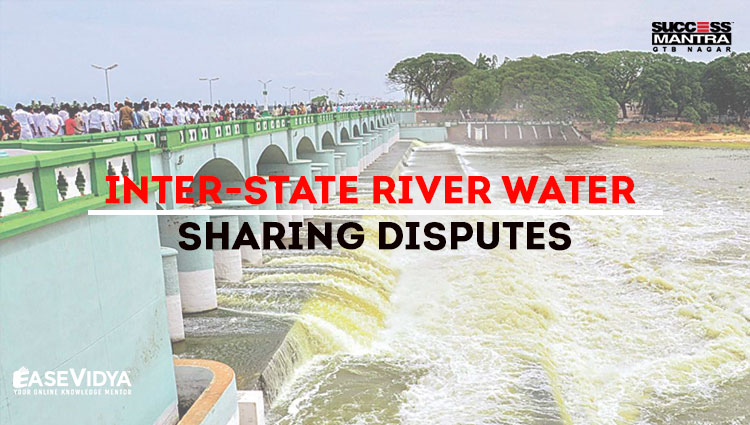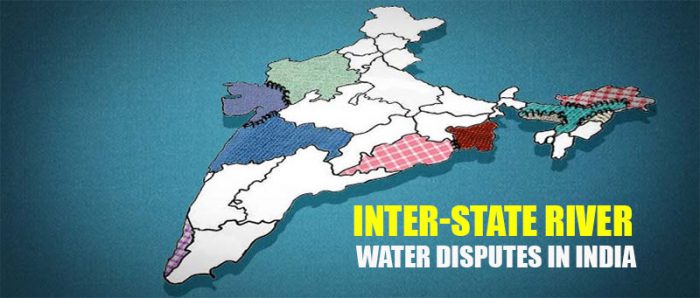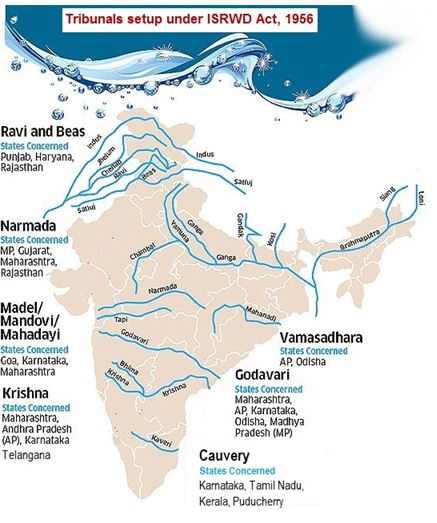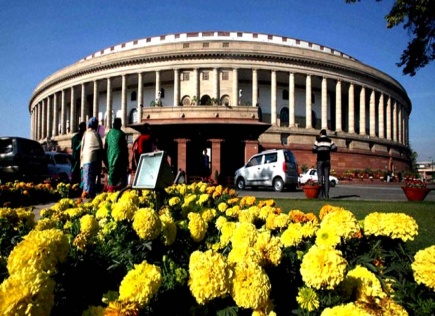
INTER STATE RIVER WATER SHARING DISPUTES
INTER-STATE RIVER WATER SHARING DISPUTES
The Inter-State River Water Disputes are one of the most contentious issues in the Indian federalism today. The recent cases of the Cauvery Water Dispute, Krishna river water disputes the Sutlej Yamuna Link Canal are some examples. Various Inter-State Water Disputes Tribunals have been constituted so far, but they had their own problems.
PROVISIONS ENSHRINED IN THE CONSTITUTION

• Entry 17 of State List deals with water i.e. water supply, irrigation, canal, drainage, embankments, water storage and water power. Entry 56 of Union List empowers the Union Government for the regulation and development of inter-state rivers and river valleys to the extent declared by Parliament to be expedient in the public interest.
• According to Article 262, in case of disputes relating to waters: Parliament may by law provide for the adjudication of any dispute or complaint with respect to the use, distribution or control of the waters of, or in, any inter-State river or river valley. Parliament may, by law provide that neither the Supreme Court nor any other court shall exercise jurisdiction in respect of any such dispute or complaint as mentioned above.
MECHANISM FOR INTER-STATE RIVER WATER DISPUTES
The resolution of water dispute is governed by the Inter-State River Water Disputes Act, 1956. According to its provisions, if a State Government makes a request regarding any water dispute and the Central Government is of opinion that the water dispute cannot be settled by negotiations, then a Water Disputes Tribunal is constituted for the adjudication of the water dispute. The act was amended in 2002, to include the major recommendations of the Sarkaria Commission. The amendments mandated a one year time frame to setup the water disputes tribunal and also a 3 year time frame to give a decision.
ACTIVE RIVER WATER DISPUTES TRIBUNAL IN INDIA
• Krishna Water Disputes Tribunal II (2004) – Karnataka, Telangana, Andra Pradesh, Maharashtra
• Mahanadi Water Disputes Tribunal (2018) – Odisha & Chattisgarh
• Mahadayi Water Disputes Tribunal (2010) – Goa,Karnataka, Maharashtra
• Ravi & Beas Water Tribunal (1986) – Punjab, Haryana, Rajasthan
• Vansadhara Water Disputes Tribunal (2010) – Andra Pradesh & Odisha.
ISSUES WITH INTER-STATE WATER DISPUTE TRIBUNALS

Protracted proceedings and extreme delays in dispute resolution. For example, in the case of Godavari water dispute, the request was made in 1962, but the tribunal was constituted in 1968 and the award was given in 1979 which was published in the Gazette in 1980. The Cauvery Water Disputes Tribunal, constituted in 1990, gave its final award in 2007. Opacity in the institutional framework and guidelines that define these proceedings; and ensuring compliance. Though award is final and beyond the jurisdiction of Courts, either States can approach Supreme Court under Article 136 (Special Leave Petition) under Article 32 linking issue with the violation of Article 21 (Right to Life). The composition of the tribunal is not multidisciplinary and it consists of persons only from the judiciary. The absence of authoritative water data that is acceptable to all parties currently makes it difficult to even set up a baseline for adjudication. The shift in tribunals' approach, from deliberative to adversarial, aids extended litigation and politicization of water-sharing disputes.
The growing nexus between water and politics have transformed the disputes into turfs of vote bank politics. This politicization has also led to increasing defiance by states, extended litigations and subversion of resolution mechanisms. For example, the Punjab government played truant in the case of the Ravi-Beas tribunal. Too much discretion at too many stages of the process. Partly because of procedural complexities involving multiple stakeholders across governments and agencies. India’s complicated federal polity and its colonial legacy.
INTER-STATE WATER DISPUTES (AMENDMENT) BILL, 2017

• In order to further streamline the adjudication of inter-State river water disputes, the Inter-State River Water Disputes (Amendment) Bill, 2017 was introduced in Lok Sabha in March 2017 by amending the existing ISRWD Act, 1956.
• The Bill envisages to constitute a standalone Tribunal with permanent establishment and permanent office space and infrastructure so as to obviate the need to set up a separate Tribunal for each water dispute which is invariably a time consuming process. In the proposed Bill, there is a provision for establishment of a Dispute Resolution Committee (DRC) by the Central Government for resolving amicably, the inter-State water disputes within a maximum period of one year and six months.
• Any dispute, which cannot be settled by negotiations shall be referred to the Tribunal for its adjudication. The dispute so referred to the Tribunal shall be assigned by the Chairperson of the Tribunal to a Bench of the Tribunal for adjudication. Under the Bill, the requirement of publication of the final decision of tribunal in the official gazette has been removed. The Bill adds that the decision of the bench of the tribunal will be final and binding on the parties involved in the dispute.
• The Bill also calls for the transparent data collection system at the national level for each river basin and a single agency to maintain data bank and information system. The proposed amendments in the Bill will speed up the adjudication of water disputes referred to it. The Bill was referred to Parliamentary Standing Committee on Water Resources for examination. The Standing Committee has submitted its recommendation on the Bill, accordingly, the Ministry has prepared draft Cabinet Note for Official Amendments to Inter-State River Water Disputes (Amendment) Bill, 2017.
CONCLUSION
• The Centre’s proposal to set up a single, permanent tribunal to adjudicate on inter-state river water disputes could be a major step towards streamlining the dispute redressal mechanism.
• However, this alone will not be able to address the different kinds of problems—legal, administrative, constitutional and political—that plague the overall framework.
• Centre’s proposal to set up an agency alongside the tribunal, that will collect and process data on river waters, can be a right step in this direction. To strengthen the cooperative federalism, parochial mindset making regional issues superior to national issues should not be allowed.
• So disputes must be resolved by dialogue and talks and the political opportunism must be avoided. A robust and transparent institutional framework with cooperative approach is need of the hour.
QUESTIONS (1-5)
Q.1 Which of the following states is not one of the party’s states of Godavari Water Dispute?
A. Maharashtra
B. Karnataka
C. Tamil Nadu: ANSWER
D. Odisha
Q.2 When was the Ravi & Beas Waters Tribunal constituted for verification of the quantum of usage of water claimed by Punjab, Haryana and Rajasthan?
A. January, 1987
B. April, 1986: ANSWER
C. March, 1989
D. November, 1990
Q.3 Which of the following statements is/are incorrect regarding the inter-state Dispute?
A. Article 262 of the constitution empowers the state legislatures to make laws for the adjudication of inter-state water dispute: ANSWER
B. The Inter-State Water Disputes Act 1956 was enacted to deal with inter-state water disputes.
C. The Government of India can constitute a tribunal to hear the disputes concerning claims of water sharing.
D. The members of tribunal are appointed by the Chief justices of India.
Q.4 Which of the following states has a serious conflict on the sharing of waters of the Cauvery River?
A. West Bengal, Karnataka, Tamil Nadu and Puducherry
B. Kerala, Karnataka, Tamil Nadu and Telangana
C. Kerala, Karnataka, Tamil Nadu and Puducherry: ANSWER
D. Kerala, Karnataka, Andhra Pradesh and Puducherry
Q.5 Which of the following Inter-State water disputes tribunals is not correct?
A. Krishna Water Disputes Tribunal (1969-76).
B. Narmada Water Disputes Tribunal (1969-1979).
C. Tungbhadra Water Dispute Tribunal (1979-1984): ANSWER
D. Cauvery Water Disputes Tribunal (1990-2007).












vrnhmwmfz
INTER STATE RIVER WATER SHARING DISPUTES <a href="http://www.gn42y0y11l4hxg1g0bw1827b9gfw48w7s.org/">avrnhmwmfz</a> [url=http://www.gn42y0y11l4hxg1g0bw1827b9gfw48w7s.org/]uvrnhmwmfz[/url] vrnhmwmfz http://www.gn42y0y11l4hxg1g0bw1827b9gfw48w7s.org/
jesywbpzn
INTER STATE RIVER WATER SHARING DISPUTES jesywbpzn http://www.g99kj047lgtw755u7yn5e4262o5resy2s.org/ [url=http://www.g99kj047lgtw755u7yn5e4262o5resy2s.org/]ujesywbpzn[/url] <a href="http://www.g99kj047lgtw755u7yn5e4262o5resy2s.org/">ajesywbpzn</a>